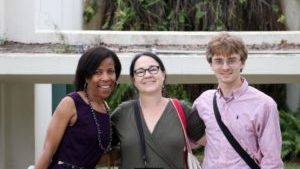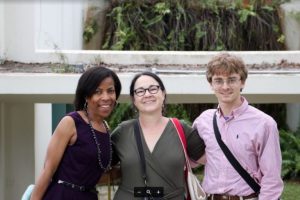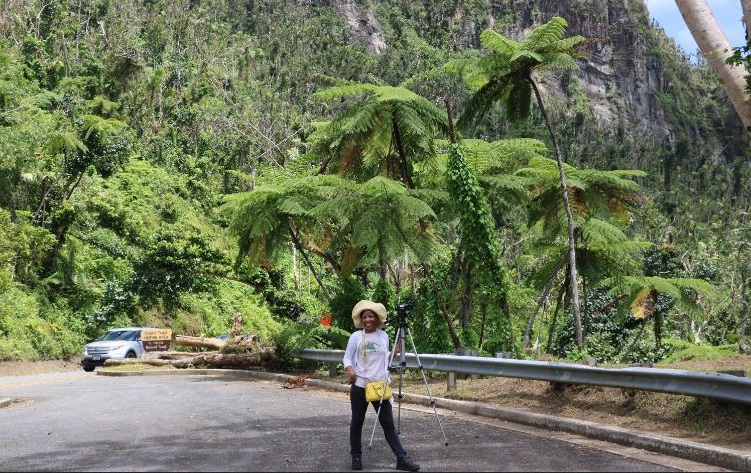Gathering Oral Histories of Drought and Extreme Weather in the Caribbean

In a recent article, PhD student Melody Hunter-Pillion describes her work on facilitating oral history interviews in the field with scientists from Puerto Rico and US Virgin Islands. The project was conducted alongside SE CASC staff and Assistant University Director for SE CASC, Aranzazu Lascurain. The original NC State news post by Ingrid Hoffius can be viewed here. Learn more about the Caribbean Oral History Project here.
PhD Student, Melody Hunter-Pillion, Teams Up With SE CASC To Conduct Oral History Interviews in Puerto Rico

November 7, 2018 | Ingrid Hoffius
This past Summer, PhD student, Melody Hunter-Pillion, traveled to Puerto Rico with Aranzazu Lascurain, Assistant University Director at the Global Change Forum/SE Climate Adaptation Science Center at NC State and James Currie – Multimedia Specialist, University of Maryland Center for Environmental Science – to conduct oral history interviews in the field with scientists from Puerto Rico.

Tell me how you got involved in this project?
I was taking Dr. Kelley’s Oral History class, and near the end of the semester, she let us know that she had received a request from the SE Climate Adaptation Science Center (SE CASC). They were looking for a historian to join them on a trip to Puerto Rico to collect oral histories. They wanted someone who has learned the oral history protocols. I was interested so I sent a resume, writing samples, and interviewed with them about why I wanted to go to Puerto Rico, and why I wanted to do Humanities work in a scientific field. It appealed to me because not only would I be able to practice what I had just learned – but also I’d be able to work with scientists and see how they viewed oral history. I’m also very interested in the Caribbean Islands and their history and how that history connects to American history.
What were the oral histories you were collecting?
The group that I went with from SE CASC, along with the U.S Geological Survey, were putting together a Caribbean Drought Workshop. This workshop was for professionals in water management and agriculture who were concerned about drought – specifically, what was currently going on, how to approach handling it, and how to help communities be more resilient and do things in a different way to get through drought and other extreme weather events. They decided that part of what they wanted to do with the workshop was to talk to the people who go through this – residents and people who manage these very important sectors when it comes to the ecology, drought, hurricanes and recovery from them. They would not only capture their stories, but find out what they’re going through and allow them the opportunity to contribute something that can be placed in an archive. Other researchers and members of the community can go back and see that experience, see strategies that they adopted or were thinking about doing and perhaps learn more about resiliency in the future.
Did they give you a set of questions to ask?
Yes. In one of our very first meetings –well before traveling to Puerto Rico – Dr. Kelley met and spoke with the scientists and other people in the SE CASC about how oral history can supplement their work. She explained how it has its own protocols and methodology, and part of that protocol is to have established questions and a framework. But then one also has that flexibility while you’re interviewing people to ask some other things if it’s going to enhance the product that you’re going to archive. So the SE CASC had their set of questions, I added questions and we went through and edited the final list and sent those questions to Dr. Kelley for her thoughts.

Were you comfortable in that role of interviewer?
I’ve interviewed people as a journalist, but oral history interviews are not like journalistic interviews. I had to relearn how to interview people, so I didn’t come in feeling like an expert at all. I really learned some great skills from Dr. Kelley, but going on the trip taught me more. I absolutely felt comfortable, but also it gave me this great sense of the importance of what I was doing and how my colleagues from another department needed me and depended on me to do the job they wanted done and to do it well – the gravity of that really was impressed on me. It made me realize that I am, and I am becoming a public historian. I had to get it right because it really reflects on the program.
So you feel that the Public History course you took really prepared you for your role as oral historian on the project?
Yes, and not only did the course prepare me, but Dr. Kelley continued to give me support. I felt like the program was totally behind me and didn’t leave me floundering out there on my own. When I had questions, she steered me in the right direction and always made me feel very capable.
Another great thing about this project was working with other departments across the university like the Southeast Climate Center and the library who, by the way, were very accommodating with helping us figure out what we needed in terms of equipment and selecting a space for oral histories. There was an assumption that the collection would be here, and then we were so surprised that NCSU was not the right location. Researchers would not come here to find this information. So Virginia Ferris, a librarian at the NCSU Special Collections Research Center pointed us to the universities and collections where researchers are already going to find climate change, drought, or Carribean resources they need. We found that the two places that Virginia told us would be the strongest were indeed the places where our collection of narratives belongs – and ultimately we chose the University of Florida which is connected to the Digital Library of the Caribbean.
You didn’t need to have that figured out before you went to Puerto Rico?
When asking people for interviews, part of the protocol is that you let them know where the information will live. We told them tentatively it would be at NCSU libraries or it might be moved to another repository. But I’m really glad this happened because it was a learning opportunity, and it let me see that with collections you have to consider access for the type of people that can make the most use of your materials – where will the most eyes see it – and it doesn’t need to be at your own university if it doesn’t make sense for it to be there.
Were the interviews videotaped?
We had an exceptional videographer – James Curry, from the University of Maryland. We also had Aranzazu to conduct the interviews with people who wanted to do them in Spanish which I feel adds to the richness of the collection. It may not be the biggest collection, but there is real quality and diversity.
Initially, what will be available and pretty quickly is each narrator’s interview in video and audio as well as the entire transcript. To add to that, Jamie is cutting a two-minute video vignette about each person. Ultimately, the SE CASC will present their project for the USGS at a conference and hopefully inspire other scientists to see the value in oral history.
Do you think you’ll be doing more projects like this in the future?
I hope so. When I was conducting interviews in Purerto Rico, I saw that I made a difference. When we were interviewing people, they wanted to tell their stories – it meant something to them. I thought to myself, I’m part of something that has meaning. I’m enabling people to make what I hope will be a large contribution to their community. So in some small way I made a difference.
The U.S. Caribbean Drought Workshop, of which the oral history project was one component, was funded by the U.S. Geological Survey (USGS) National Climate Adaptation Science Center (NCASC) and held in collaboration with the Southeast CASC and the USDA Caribbean Climate Hub. The workshop was hosted by Bill Gould (Director, Caribbean Climate Hub) at the International Institute of Tropical Forestry in San Juan, Puerto Rico. Kate Malpeli (Biologist, NCASC) and Shawn Carter (Acting Chief, NCASC) organized the workshop in close partnership with colleagues from the Southeast CASC, Caribbean Climate Hub, and U.S. Fish and Wildlife Service. Approximately 50 participants, the majority of whom were from Puerto Rico and the U.S. Virgin Islands, attended the workshop.
The oral history component of the project was funded by North Carolina State University and NCASC. Aranzazu Lascurain (Assistant University Director, Southeast CASC), Cari Furiness (Program Manager, Southeast CASC), and Kate Malpeli coordinated the effort. Melody Hunter-Pillion (NCSU) served as the project’s oral history adviser and interviewed participants, along with Aranzazu Lascurain. Jamie Currie (Multimedia Specialist, University of Maryland Center for Environmental Science) served as videographer and is currently processing the interviews.
The project is also thankful to Dr. Blair Kelley for her time and guidance to ensure a quality oral history collection.
The repository for the oral history collection is the Digital Library of the Caribbean, managed by the University of Florida.
The oral histories are featured in a short YouTube clip.
Watch Melody on WRAL discuss her work in Puerto Rico.
Melody Hunter-Pillion is a first-year student in the Public History PhD program. Learn more about her HERE.
- Categories:
